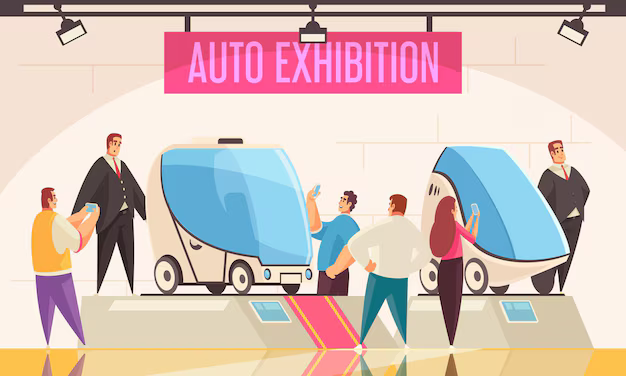



How a Leading Auto Expo Used QR Code Feedback to Measure Brand Lift, EV Interest, and Purchase Intent?


22%
of visitors showed increased purchase consideration

32%
planned to visit a dealership post-event

2×
higher interest in EV brands among first-time attendees

QR feedback gave us data we’ve never had before – real-time insights on what people thought about our brand, booths, and new models. Not just traffic numbers, but actual intent and image perception.

Brand Experience Team, Leading Auto Expo
GIIAS
How a Leading Auto Expo Used QR Code Feedback?
Request a Demo

Here's a quick summary.
The Objective
To understand how auto brands were perceived across hundreds of booths and which experiences impacted purchase intent, brand recall, and dealership visits – both during and after the Leading Auto Expo.
The Challenge
This flagship auto event needed to measure brand uplift and future buying behavior, but lacked:
1.
Tools to track real-time sentiment across multiple car brands
2.
Visitor-level insights on product interest and brand recall
3.
Post-event follow-up limitations (no CRM or attendee emails)
The Solution
The organizers of this Leading Auto Expo didn’t want to wait for a post-event report to understand what worked. They needed real-time insights – during the event, while they could still act on them.
So they partnered with SurveySensum to bring feedback into the moment – using QR code surveys strategically placed across high-traffic zones of the event.
Here’s how it came together:
Step 1: Designing the Right Feedback Flow
Before the expo began, we collaborated with their brand experience team to create mobile-first survey flows. No lengthy forms, no app downloads – just 4-5 quick, high-impact questions. The focus?
- Experience at the booth
- Brand recall and emotional resonance
- EV perception
- Purchase and dealership intent
- Likelihood to recommend
We optimized the survey to be completed in under 30 seconds, while still capturing deep qualitative insights through open text.
Step 2: Strategic QR Code Placement
We generated smart, location-based QR codes and placed them where people naturally paused –
- At test drive waiting zones
- Inside EV experience pods
- Near interactive brand displays
- Around dealership kiosks
- At rest areas, lounges, and exits
This made participation effortless. No pushing, no chasing. Just the right nudge, at the right moment.
Step 3: Light On-Ground Support
With the help of a few trained volunteers, attendees were gently invited to scan the QR codes and share their thoughts.
The approach was simple: friendly, no-pressure nudges at booths and lounges. This personal touch helped drive response rates significantly – especially among older or less tech-savvy visitors.
Step 4: Real-Time Monitoring and Action
As feedback started flowing in, brand and ops teams monitored a live dashboard with real-time insights on:
- Which booths were resonating most
- What visitors thought about the new EV models
- Whether people found the layout, navigation, and signage helpful
- Which factors were driving purchase intent (or causing drop-off)
→ When people reported confusion about booth locations or long queues at test drives — the team acted on the spot, adjusting signage and deploying more staff.
→ When a specific EV brand saw a spike in interest — the dealership team was notified to proactively engage those audiences.
This wasn’t just a survey. It was a real-time intelligence engine driving live decisions — from booth management to brand storytelling.
And it paid off!
Step 5: Capture the Moments That Mattered
Beyond just operations, the survey also asked attendees how they felt about the brand, whether they’d consider using its services, and what stood out most. This gave the brand team deeper insight into:
- Emotional connection with the experience
- Impact of their campaigns and activations
- Which booth activities drove real brand affinity
Attendees scanned custom QR codes to share:
- Enjoyment levels
- Brand connection
- Offer relevance
- Booth interactivity
- First-time vs. repeat visitor experiences
Impact

22%:
of visitors showed increased consideration for brands they interacted with

32%:
planned to visit a dealership or request info post-event

2× uplift:
in EV brand interest among first-time auto show attendees

Higher unaided recall:
for brands with immersive or interactive displays (e.g., VR test drives)

Visitors:
described top brands as innovative, premium, and reliable
Smart Data Captured
- Brand recall & image perception
- Booth experience ratings
- Purchase/usage intent
- Word-of-mouth likelihood
- EV category interest vs. traditional
- Post-event follow-up likelihood

The Gaikindo Indonesia International Auto Show (GIIAS) is an annual auto show held in Indonesia since 2015. Organized by Seven Events, and hosted by the Association of Indonesian Automotive Industries (GAIKINDO) hence its name,[1] the show was spun off from the Indonesia International Motor Show (IIMS). It is currently claimed as the second largest auto show in the world behind biennial automotive shows from China, such as the Auto Shanghai and the Beijing Motor Show, since 2024.
Industry
Auto Expo
Region
Indonesia
Company Size
Large Size
Business Type
B2B, B2C
Businesses that found their solutions with SurveySensum

Learn how businesses are making their feedback actionable
Want to get started with SurveySensum?







